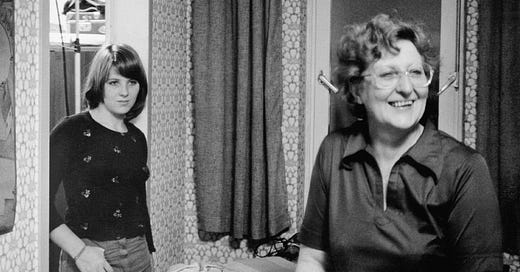Forgive my brief absence, I’ve been on a European tour. And while this vacation (from what, I don’t know) has been lovely, it’s taken me away from my movies. Okay, I did watch Ferrari on my flight to the continent, have snuck in an episode of Summer House here and there, and the other night I managed to watch this West German late 70s doc that was so fucking upsetting I was unable to leave my bed for a pint of Guinness (actually good in Ireland!).
In Is This Fate?, documentarian Helga Reidemeister fixates on Irene Rakowitz, a miserable German women in her late 40s. It’s an entirely violent movie, one that chronicles the unhappy sagas of an unhappy family. They hold onto a belief that their strife is unique to their situation, and not a universal condition that all those bound by blood experience. Therefore, Reidmeister’s quest must be a patient one, particularly as she affords Irene the ability to reveal challenging and unpleasant truths.
Irene lives with her two youngest children, a boy and girl, in a housing project in West Berlin. Her ex-husband lives in the same apartment complex, and elsewhere in the city are older spiteful daughters. While most of the family get in their talking points, Is This Fate? lingers on Irene and a 17-year-old daughter, who has moved out and is now living with her father. The children, for the most part, hate Irene, and have both stripped her of the identity marker she’s held onto for so long—mother—and reduced her to a bothersome caretaker role. Her daughter dreams of a more pleasant mother, perhaps someone more akin to an open-hearted friend, and resents Irene’s exhaustion, her meekness, and her nagging. For Irene, that greatest tragedy of this is that she’s been able to be little else but a mother and wife. And stuck with that, she can’t even be acknowledged for the sacrifices she’s made!
Her daughter sucks, is an ungrateful snob who can’t stand the idea of having a mother who makes her do chores and isn’t some sort of perfect doting housewife. I’m sure there’s been a lot of analysis of Reidmeister’s film that considers generational discord as one of the roots of conflict. Her children are post-war babies, and are somewhat free of the hardship Irene carries in her. And Irene, for all my sympathy, is joyless, hatable, and one understands why her children reject her—even if their rejection is what turned her into this pitiful force in the first place.
Through Is This Fate? we learn a little bit about Irene’s life, particularly her own relationship to her mother, who she believes was incapable of loving her. From a young age, Irene was determined to never let her kids feel unloved, even if—as she soon realized—showing them love was something not natural to her either. She speaks with a candidness that is often brutal as she chronicles her pain. But her confessions feel necessary, cathartic in how they dismantle any sort of fantasy about parent-child relationships. Sometimes you can’t love them, your parents or your kids. Sometimes all you can feel is this all-consuming vitriol. It’s a violent revelation, told and told again throughout this over two-hour doc, but a welcome gut punch.
There’s other confessions that stand out. Irene speaks of her rotten marriage, how she never once enjoyed sex with her husband, and if there’s any levity to be found, it’s in her new sexually satisfying relationship with her boyfriend. We also learn about the dynamics between her younger children, which already begin to feel cyclical, like something that will play out again and again throughout their lives. Her daughter picks on the younger son and has no problem acknowledging that this is what she does and what she might always do.
However claustrophobic Is This Fate? is, it at least doesn’t gloss over how ugly family life can be.
—
At first I was going to spiral on about whether or not I wanted to children in this post, but I’ll leave that for a future post. I’ve got to keep you all coming back somehow!
But anyway, familial violence! I think about it a lot, in a bunch of different ways. I rewatched Wiseman’s Domestic Violence not too long ago, and it’s similarly relentless and unpolished. It calls forth this anxiety, but that’s sort of easier to navigate Domestic abuse is, after all, so overtly wrong and bad and violent and oppressive.
When I finished Is This Fate? I knew I felt rattled but had a hard time untangling the why. I guess it’s the sense of stuckness that feels the most damaging. Family, having one and being a part of one, means you ‘re committed to a role assigned to you, and if you fail to live out that role in the way we, as a culture, have determined is fit, its domino effect can be generation-spanning. It’s a lot of pressure and sometimes it can feel, or at least it feels with Irene, like you never had a chance.
I don’t know if this is an evil film, one that’s arguing we are all doomed to fuck each other up by not living up to our roles of perfect parent or perfect child. But in my discomfort, it made me realize the sooner any of us can make peace with the oppressive nature of expecting too much from the people you’re born to love, the easier you can love them and live life (relatively) free of conflict. Or, if that doesn’t work, you should have the freedom to reject them too.




